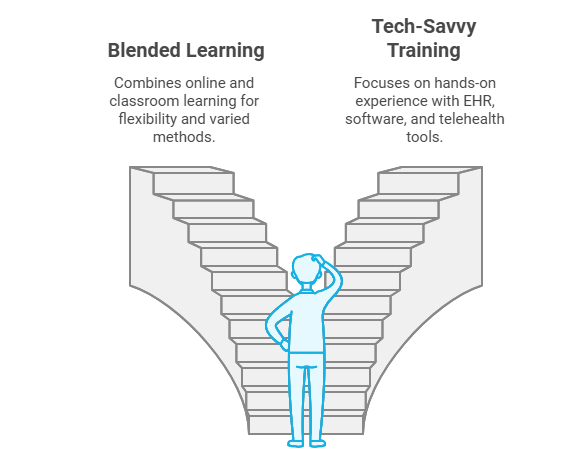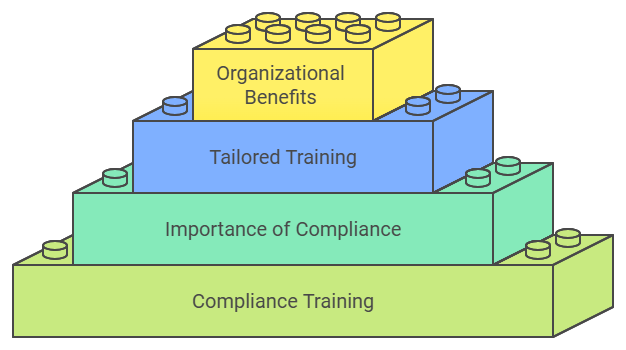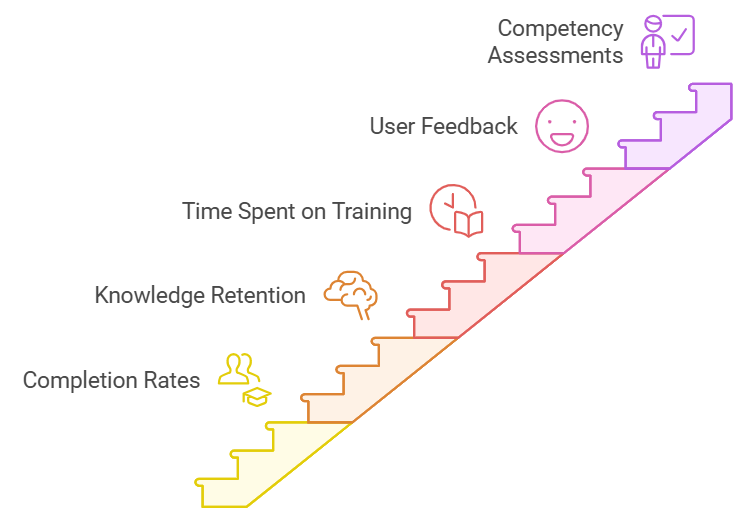Importance of Training in Healthcare Administration
Training is like the secret sauce that equips the folks in medical practice admin roles with the skills and knowledge they need to crush it at their jobs. Getting a grip on the ever-shifting responsibilities and must-have skills is key to building a top-notch admin team.
Evolving Role of Medical Administrative Assistants
Looking back to 2021, the Industry Outlook revealed that 42% of employers noticed medical administrative assistants taking on more duties than ever. This underscores their integral role in the healthcare system and the need for them to receive a skills upgrade to keep up. These assistants are the unsung healthcare heroes, making everything run like a well-oiled machine. They’re all about juggling patient records, setting up appointments, and sorting billing and insurance claims. Their job isn’t just about a one-lane highway anymore; it’s a multi-lane expressway, demanding a knack for handling a boatload of tasks and staying ahead of the game.
Essential Skills Required for Healthcare Administrators
For healthcare administrators, it’s not just a walk in the park; they must juggle various skills to handle the chaotic healthcare scene. Some of these essential skills include:
- Analytical Know-How: To increase efficiency, they must assess processes and make smart choices based on data.
- Problem-Solving Grit: They must tackle emergencies and hammer out solutions when operations hit a bump.
- Thinking Critically: Understanding and applying healthcare regulations ensures everything’s up to code.
- Communication Smarts: Being able to break down policies and procedures for both staff and patients.
- Leadership Mojo: Leading teams, sparking positive changes, and rallying the staff towards shared goals (Pacific College).
Health administrators need to be knowledgeable about legal issues to make well-thought-out decisions that adhere to regulations. Knowing the ins and outs of patient privacy laws and industry standards is vital to dodge legal hiccups and keep healthcare on the up and up (Pacific College).
Comprehensive training programs that sharpen these skill sets are a surefire way to ensure the admin crew is ready to tackle healthcare’s wild ride. Effective training does more than keep things running smoothly; it ramps up patient care, slashes risks, cuts down on mistakes, and fosters a compliance-focused vibe in medical practice (Connecteam). Regular training, especially around compliance and regulations, keeps the ship steady, avoiding legal fines and financial blunders and protecting the good name of the medical practice. This reassures you of your staff’s capabilities and readiness to handle the challenges of the Healthcare Industry.
Effective Training Strategies

Nailing down the right training tactics is critical for equipping healthcare receptionists and administrative staff in medical practices with the skills they need. Here, we’ll break down two useful strategies: mixing up learning styles and becoming tech-savvy.
Blended Learning Approaches
Blending learning styles in training programs offers a complete and exciting experience for administrative staff in the medical field. By combining online learning with the more traditional classroom setup, organizations can provide a flexible learning method that caters to how different people prefer to pick up new skills.
This type of learning uses a mix of methods, such as bite-sized learning, practice scenarios, hands-on case studies, and team-based education, to really boost understanding. Such variety helps participants connect with the content in a way that suits them best, leading to better learning outcomes that can be applied to real-life situations.
What’s cool about blended learning is its flexibility. It lets employees soak in the information at their own speed, which fits around different schedules and styles. By involving feedback-driven methods, organizations can monitor how everyone’s doing and tweak the training to fit individual needs, making the whole program more effective.
Incorporating Technology in Training
Using technology is a game-changer for training healthcare receptionists and administrative staff. It’s all about giving them the skills to handle high-tech systems and tools in modern medical practices, where Electronic Health Records (EHR), management software, telehealth platforms, and more are crucial for making things efficient, accurate, and compliant behind the scenes and in patient care.
Tech in training means staff can use these advanced systems, allowing them to become comfortable with the tools they’ll be using daily. This hands-on learning can boost confidence and expertise, leading to smoother operations within the medical setting.
Plus, tech-based training can be done anywhere, thanks to remote access, which is excellent for a spread-out team. It adds convenience and cuts down interruptions to the usual workflow. Including interactive quizzes, virtual scenarios, and game-like lessons can make learning fun and keep staff engaged.
By blending learning styles and diving deep into tech, medical practices can improve their administrative teams, ultimately boosting the quality of care and running a tighter ship.
Compliance Training in Healthcare

In the healthcare scene, compliance training is where rules and reality meet to ensure providers and patients stay in safe hands. It’s a required drill, not just a suggestion, and it’s all about giving employees a crash course on the job norms they have to adhere to. Think of it as the lifeline that keeps everyone from stepping on regulatory landmines, especially if the training fits according to what each employee actually does.
Importance of Compliance Training
Healthcare pros have a big book of rules to follow, and messing up on these is no small potatoes. Skimping on the necessary compliance know-how can lead to big problems like steep fines, job losses, or dragging the organization’s name through the mud (MedTrainer). To dodge this nightmare, compliance education should trickle down from the higher-ups, protecting both people and the organization. Compliance training not only ensures legal adherence but also fosters a culture of responsibility and accountability, which can boost morale and productivity.
Keeping track of who’s learned what is your best buddy when sidestepping trouble. Nailing this from the get-go means healthcare operations run smoothly without any oops moments that could land them in court. Plus, this proactive mojo doesn’t just end at following the legal playbook; it nurtures a vibe of owning up to responsibilities, boosting morale and accountability among workers.
Tailoring Training to Job Descriptions
A standout strategy for making compliance training effective in healthcare is to mold the educational content to employees’ job descriptions. Each role comes with unique rules and tasks, from the receptionist to the head surgeon. By ensuring training aligns with what each gig requires, employees gain the essential insights and skills needed to do their jobs without breaking a sweat over compliance.
Setting up training that genuinely matches the tasks at hand means workers are not just equipped but ready to cruise through the complicated streets of regulations. The benefits are double-fold, boosting employee confidence while keeping the organization’s learning gears well-oiled. In the end, a well-informed team translates to patients getting top-tier, safe care delivered by professionals who know their stuff and respect the highest standards in healthcare.
Assessing Training Effectiveness

In healthcare admin, checking how well training works for your staff is key to keeping things running smoothly. By seeing how these training programs are doing, medical practice managers can check how competent their team is. In this part, we’ll discuss different ways to measure how well training works and how to boost your staff’s competency.
Metrics for Training Evaluation
Completion Rates
Completion rates are a biggie when evaluating the performance of healthcare learning systems (LMS). A high rate means your people are into the program, showing they’re committed. A low rate might mean the content is not hitting the mark or the way it’s being delivered needs tweaking.
Knowledge Retention
You have to know if your healthcare training is sticking with your staff over time. Quizzes and tests in the LMS help you see how well the information is being remembered and used, pinpointing what parts of the training are solid and what might need a little more work.
Time Spent on Training
Keeping an eye on how long staff spend on training helps balance quantity with quality (LinkedIn). Quick completions might mean the material is easy, while longer times could show areas that need a closer look to streamline and make training more effective.
Enhancing Competency through Assessments
User Feedback and Satisfaction
Getting feedback and checking users’ satisfaction provides insights you can’t miss (LinkedIn). Surveys or forms mixed in the LMS give a direct line to what’s working or what ain’t, helping shape a more user-focused approach to your training plans.
Competency Assessments
After training, competency checks are essential to see if your staff is ready to use their new knowledge when it counts. These practical tests show how well the training is working, offering a real look at staff skills and how they’re likely to positively impact patient care.
By mixing numbers with user feedback, healthcare administrators can fully assess whether training programs for admin staff are doing what they should. This data-driven approach not only sharpens staff but also improves the overall quality of healthcare services.
Well-trained medical admin staff are the backbone of efficient practice operations. Equip your team with the skills and confidence to streamline processes and enhance patient care. Empower Your Team Today! Let Karma Health guide your training initiatives for medical admin staff. Contact us to revolutionize your practice operations!




